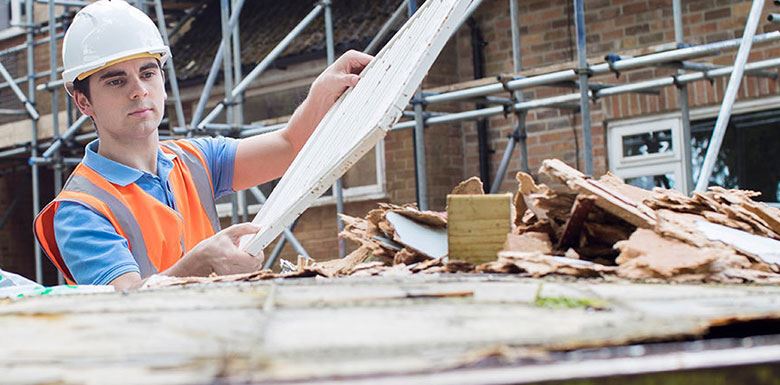Waste carrier licences: What you need to know
 In this article
In this article
No matter what trade you specialise in, it’s safe to say that many trade jobs can leave behind quite a mess when you’re done – waste that you may then need to dispose of rather than leaving it to your customer.
However, in order to carry and dispose of this waste without penalty, or to carry waste in a commercial capacity as a business, you need to have what’s known as a waste carriers’ licence.
Take a look at our guide below to learn more about what a waste carrier licence is, their different tiers, how much they cost, and more, so you can avoid being fined when dealing with post-work rubbish.
What does a waste carriers' licence allow me to do?
For the most part, a waste carriers’ licence is self-explanatory – it is a licence that allows you to legally transport and dispose of waste as part of your business service offering. For example, were you installing a customer’s bathroom, a waste-carrying licence would allow you to safely dispose of their old sink and bath without issue.
On the other hand, if you were performing this sort of work without the necessary licence, and you were stopped by a Local Authority Waste Enforcement Office or an Officer of Natural Resources England or Wales, then you could be liable to pay a Fixed Penalty Notice of £300 or fined up to £5,000 if you had any waste on your vehicle at the time.
In other words, a waste carriers’ licence will save you the headache of having to resolve potentially devastating fines while legally allowing you to offer waste disposal to your clients are part of your service offering.
Who needs a waste carriers' licence?
A waste carrier’s licence is a must for any tradesperson who currently, or plans to, handle the disposal of work waste. In being registered, you, or any person employed by you, will be covered under the registration - provided they’re acting on your behalf during their employment.
Please note, however, that contractors, subcontractors, or agents of a registered person are not covered by a waste-carrying licence, and they will need their own licence in order to perform this sort of work for you.
What are the different waste licence tiers?
Waste carrying licences are available in both an upper and a lower tier. But while similar in principle, these two tiers cover different levels and degrees of waste disposal.
In short, these levels are based on either your type of organisation or the type of waste you carry, rather than the quantity of waste you might have to transport - so you may need to register in the upper tier even if you only transport or deal in very small amounts of waste as part of your job.
Therefore, before making your application for a waste carrying licence, you’ll need to consider which one best fits your business and service offering so you pick the right one:
What can a lower tier waste carrier carry?
For waste management purposes, a lower-tier licence allows you to safely transport and dispose of waste and any other related rubbish that might be produced as a byproduct of your job.
What can an upper tier waste carrier carry?
Unlike a lower tier licence, an upper tier waste carrying licence is required if you find yourself transporting things you’ve removed from the job on behalf of the customer, such as construction and demolition debris, walls, fences, wastes from house clearances, and other large waste objects.
What is the cost of a waste carriers' licence?
When it comes to the cost of waste carrier licences, the lower tier option is completely free, making applying for it a no-brainer if you know you’ll likely be transporting even small amounts of waste from your job.
Applying for an upper-tier licence, on the other hand, does require you to pay a small application fee of £154 (VAT exempt) for the first three years, with renewal for a further three years costing £105 (VAT exempt) – not much in the grand scheme of things but worth budgeting for if you think you’ll be handling large waste items when working.
How do I get a waste carriers' licence?
In order to register for a waste carriers’ licence you’ll need to head to gov.uk and provide the names and date of birth for the owners of the business, as well as executives, partners, or directors.
From here, if you plan to transport waste as your business model, then you’ll also need to provide information about any environmental offences that have been previously committed.
Finally, if you’re looking to apply for an upper-tier licence, you’ll be asked to fill in your preferred method of payment (usually debit or credit card). Once all this is received and confirmed, you will be provided with your waste-carrying licence, and your customers will also be able to check if your business has a waste-carrying licence on the Register of Waste Carriers, Brokers and Dealers.
Important things to remember when transporting waste
Although a waste-carrying licence is all you require to legally remove rubbish as part of your work, it’s important to note that there are still best practices you are expected to follow when disposing of your waste.
For example, a customer may either pay you or more commonly trust you to dispose of their waste in the correct manner. This means taking it to the relevant disposal facility rather than resorting to flying tipping.
As part of this process, you may be required to keep or have records of any Transfer Notes for waste that is taken away and disposed of by yourself as a means to prevent fly-tipping from occurring or leading to your prosecution if your waste ends up outside of a disposal facility.
It’s also important to note that, if you don’t have your own licence but engage with a company to carry the waste from your jobs, then either you or your customer may be liable for fly tipping offences if your details are found within the waste and traced back to you.
To help protect against this, we advise that you keep all copies of your paperwork in the contract and obtain copies of waste transfer documents proving you have passed this onto the waste carrier you are employing in order to prove that you did not commit these offences yourself.
Finally, always check that any rubbish you remove from a customer’s property does not include any personal or sensitive information about the customer. Otherwise, you may be classed as the controller of that information, which may put you in breach of the General Data Protection Regulations if you do not control or dispose of this data correctly.
If you require more information this can be found for England at www.gov.uk, for Northern Ireland at www.daera-ni.gov.uk, for Scotland at www.sepa.org.uk and for Wales at www.naturalresources.wales.
Demonstrate your professionalism with Which?
Disposing of waste legally and safely is just one of the ways in which you can display the professionalism of your business. However, if you want to show your customers that your business is reliable and trustworthy, then you should consider signing up as a Which? Trusted Trader.
All Which? Trusted Traders get access to their own business profile to display examples of their work and customer reviews, as well as a dedicated account manager to provide assistance when needed.
Become a Trusted Trader
When customers see you displaying our logo, they'll know you're a trader they can trust
Find out more




